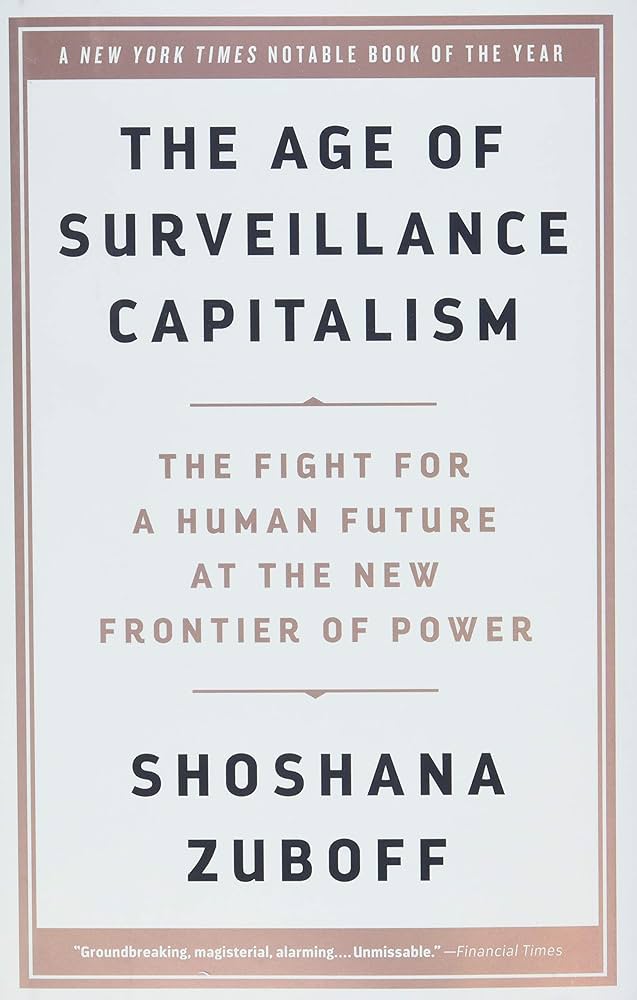Shoshana Zuboff’s “The Age of Surveillance Capitalism” explores the rise of a new economic system centered on data extraction. It delves into how tech giants profit from personal data.
This groundbreaking audiobook examines the implications of surveillance capitalism on society. Zuboff argues that companies like Google and Facebook have pioneered a new form of capitalism that leverages user data for profit. This practice raises ethical concerns and questions about privacy and autonomy.
The book provides a deep dive into the mechanisms of data collection and its impact on human behavior. Readers will gain insight into how their data is harvested and used. This audiobook is a crucial resource for understanding the modern digital economy and its societal ramifications.
Introduction To Shoshana Zuboff And Her Magnum Opus
Shoshana Zuboff is a renowned scholar and author. Her work, ‘The Age of Surveillance Capitalism’, explores the dark side of the digital era. This audiobook reveals how tech giants exploit our data.
Background Of Shoshana Zuboff
Shoshana Zuboff is a professor at Harvard Business School. She is an expert in business administration. She has written many influential books.
| Aspect | Details |
|---|---|
| Education | Ph.D. from Harvard University |
| Specialization | Business Administration |
| Notable Works | ‘The Age of Surveillance Capitalism’ |
Her research focuses on the impact of digital technologies. She argues these technologies shape our lives in unseen ways.
Synopsis Of ‘the Age Of Surveillance Capitalism’
‘The Age of Surveillance Capitalism’ is an eye-opening book. It discusses how companies collect and use personal data. This data shapes our behaviors and choices.
- Tech giants like Google and Facebook gather data.
- They use this data to predict and influence our actions.
- The book reveals the hidden mechanisms behind these practices.
Zuboff introduces new terms like “surveillance capitalism”. She explains how it differs from traditional capitalism. The audiobook delves into the ethical implications of this new era.
- Data is collected without our knowledge.
- It is then used to create detailed profiles.
- These profiles are sold to advertisers.
The audiobook warns of the dangers of unchecked surveillance. It calls for new regulations and protections.
The Genesis Of Surveillance Capitalism
Shoshana Zuboff’s The Age of Surveillance Capitalism audiobook delves into the intricate world of surveillance capitalism. This term represents a new economic order that claims human experience as free raw material for hidden commercial practices. In this section, we explore the genesis of surveillance capitalism.
Origins And Definitions
Surveillance capitalism emerged in the early 21st century. It was first introduced by Google. This concept revolves around collecting user data to predict behavior. This data is then used for profit. The term was coined by Shoshana Zuboff, a scholar and author.
Surveillance capitalism utilizes personal data. This data includes search history, social media activity, and online purchases. Companies collect, analyze, and sell this data. The goal is to influence and predict future behavior.
Key Players And Technologies
Several key players dominate the surveillance capitalism landscape. They include Google, Facebook, and Amazon. These companies gather vast amounts of data from users. They use advanced technologies to process and analyze this data.
| Company | Key Technologies |
|---|---|
| Search Algorithms, Ad Targeting | |
| Social Graph, Machine Learning | |
| Amazon | Recommendation Engines, Data Analytics |
The technologies used include machine learning, big data analytics, and AI. These tools help companies to predict and influence user behavior. Surveillance capitalism raises ethical concerns. It questions privacy and data security. Yet, it continues to grow and evolve.
Core Concepts And Theories
The audiobook “The Age of Surveillance Capitalism” by Shoshana Zuboff unveils groundbreaking ideas. These concepts reshape our understanding of the digital economy. Two key theories stand out: Behavioral Surplus and Instrumentarian Power. Let’s dive deeper into these core ideas.
Behavioral Surplus
Behavioral Surplus refers to data collected from users’ online activities. Companies gather this data beyond what they need to improve services. This surplus data is then monetized. It is sold to advertisers and other entities. This practice raises serious privacy concerns.
For instance, social media platforms track user behavior. They analyze likes, shares, and comments. This data helps them predict user actions. Advertisers then use these predictions to target ads more effectively. This creates a cycle of data collection and monetization.
Instrumentarian Power
Instrumentarian Power is a new form of control. It goes beyond traditional surveillance. It uses data to shape human behavior. Companies use algorithms to guide decisions and actions. This control is subtle but powerful.
For example, recommendation systems on streaming platforms. They suggest shows based on your viewing history. This influences your choices without you realizing it. Over time, this power becomes pervasive. It affects how we think and act.
Understanding these concepts is crucial. It helps us navigate the digital age with awareness. Zuboff’s audiobook sheds light on these hidden dynamics. It urges us to rethink our relationship with technology.

Impact On Society
Shoshana Zuboff’s audiobook, The Age of Surveillance Capitalism, delves deep into the profound effects of surveillance capitalism on our society. This thought-provoking work examines how data collection practices reshape our world. Here, we explore two crucial areas influenced by these practices: Privacy Erosion and Democracy at Risk.
Privacy Erosion
In today’s digital age, privacy is a fading concept. Companies collect vast amounts of personal data. This data is used to predict our behavior. Our online actions are tracked and analyzed. We lose control over our personal information.
Consider these key aspects of privacy erosion:
- Data Collection: Our data is gathered without our full awareness.
- Behavioral Analysis: Companies predict our actions based on this data.
- Lack of Consent: We often do not know our data is being used.
These factors contribute to the erosion of our privacy. The digital world becomes a place where personal space is rare.
Democracy At Risk
Surveillance capitalism also threatens democracy. The manipulation of information can sway public opinion. This manipulation affects elections and policy decisions. Informed citizenry becomes a challenge.
Key elements of this risk include:
- Information Control: Powerful entities control what we see online.
- Political Influence: Data is used to influence voters and policies.
- Reduced Transparency: Lack of transparency in data use undermines trust.
Our democratic processes suffer as a result. The power of the people becomes compromised.
Understanding these impacts is crucial. It helps us navigate the challenges of the digital age. By being aware, we can strive for a better, more informed society.
The Role Of Big Tech
The Age of Surveillance Capitalism by Shoshana Zuboff reveals the power of Big Tech. Zuboff shows how companies use our data for profit. This audiobook uncovers the hidden world of data exploitation.
Google And Facebook
Google and Facebook are the leaders in data collection. They gather data from every click, like, and search. This data helps them create detailed profiles of users.
- Google: Tracks your searches and online behavior.
- Facebook: Monitors your social interactions and preferences.
These tech giants use this data to sell targeted ads. Advertisers pay huge sums for this personalized advertising. This practice makes Google and Facebook incredibly powerful.
Exploitation And Expropriation
In the audiobook, Zuboff describes data exploitation. Big Tech collects data without our consent. They use this data to manipulate our choices and behavior.
| Exploitation | Expropriation |
|---|---|
| Collecting data without asking | Using data for profit |
| Tracking every online move | Selling data to advertisers |
Users have little control over their own data. Zuboff calls this process “surveillance capitalism.” It turns our personal lives into a source of profit.

Economic Implications
The economic implications of Shoshana Zuboff’s “The Age of Surveillance Capitalism” are profound. This audiobook delves into how surveillance capitalism reshapes economic landscapes. Below, we explore two significant areas: new markets and labor changes.
New Markets And Capital Forms
Surveillance capitalism has birthed new markets. These markets thrive on data collection and analysis. Companies harvest personal data to predict behaviors. This data becomes a new form of capital. It’s valuable in targeted advertising and other sectors.
Traditional markets relied on goods and services. Now, data is the product. This shift has created immense wealth for tech giants. Companies like Google and Facebook dominate these new markets. Their business models depend on user data.
| Old Market | New Market |
|---|---|
| Goods and Services | Personal Data |
| Physical Products | Behavioral Predictions |
The rise of these markets poses questions. Is our data safe? Who controls it? These are issues Zuboff addresses in her audiobook.
Labor And Employment Changes
Surveillance capitalism also impacts labor and employment. It changes how companies manage workers. Technology monitors employee performance. This surveillance can increase productivity. But it also raises privacy concerns.
- Real-time monitoring
- Performance tracking
- Data-driven management
Gig economy platforms like Uber and Lyft use these methods. Workers are constantly tracked and rated. This data affects their job security. Traditional jobs also see these changes. Office workers face similar monitoring tools.
Automation and AI further alter employment landscapes. Machines replace some jobs. New roles emerge in data analysis and tech support. The balance between job creation and loss remains uncertain.
Zuboff’s audiobook explores these shifts. It highlights both opportunities and risks. Understanding these changes is crucial for future economic planning.
Resistance And Regulation
Shoshana Zuboff’s “The Age of Surveillance Capitalism” audiobook dives deep into the dark side of data. The book explores how big tech companies harvest personal information. This data is then used to predict and influence our behavior. But there is hope. People and governments are fighting back. They are taking steps to resist and regulate these practices.
Legislative Efforts Worldwide
Governments around the world are waking up to the dangers of surveillance capitalism. They are introducing laws to protect their citizens’ data. The General Data Protection Regulation (GDPR) in Europe is a prime example. It gives people more control over their personal information.
Other countries are following suit. California Consumer Privacy Act (CCPA) is another strong regulation. It aims to protect the privacy of California residents. These laws are setting new standards for data privacy globally.
| Region | Legislation | Year Enacted |
|---|---|---|
| Europe | General Data Protection Regulation (GDPR) | 2018 |
| California, USA | California Consumer Privacy Act (CCPA) | 2020 |
Individual And Collective Actions
People are not just waiting for governments to act. They are taking matters into their own hands. Using encryption tools is one way to protect personal data. Many are switching to privacy-focused search engines like DuckDuckGo.
Collective actions are also gaining momentum. Movements like #DeleteFacebook are pushing back against data misuse. Activists are raising awareness and educating others. They are demanding better privacy practices from tech companies.
- Use encryption tools for secure communication.
- Switch to privacy-focused search engines.
- Participate in movements like #DeleteFacebook.
- Educate others about data privacy.
Shoshana Zuboff’s audiobook highlights these efforts. It shows that resistance and regulation are possible. We can take back control of our data.
Looking Ahead
As we explore the ideas presented in Shoshana Zuboff’s audiobook, The Age of Surveillance Capitalism, it’s crucial to look ahead. What does the future hold for our digital landscape? This section delves into future trajectories and the role of ethics and governance.
Future Trajectories
The future of surveillance capitalism is both exciting and uncertain. We can expect rapid advancements in technology. These advancements will shape our daily lives. They will impact our privacy, security, and personal freedom.
Artificial Intelligence (AI) and machine learning will play a significant role. They will analyze vast amounts of data. This can lead to new innovations and conveniences. But it also raises concerns about data misuse.
| Aspect | Future Impact |
|---|---|
| Data Collection | More extensive and detailed |
| Privacy | Greater risks and concerns |
| Innovation | New technologies and services |
The Role Of Ethics And Governance
Ethics and governance will be key to shaping the future. We need clear rules and guidelines. These will ensure data is used responsibly.
Governments and organizations must collaborate. They should create frameworks to protect individuals. This includes laws and regulations. It also involves ethical standards for companies.
- Establishing transparent data practices
- Implementing strong data protection laws
- Promoting ethical AI development
Individuals also play a role. We must stay informed and demand accountability. This will help create a more balanced digital future.

Frequently Asked Questions
What Is “the Age Of Surveillance Capitalism” About?
“The Age of Surveillance Capitalism” by Shoshana Zuboff explores how corporations exploit personal data. It reveals the hidden mechanisms of data-driven capitalism and its impact on society.
Who Is Shoshana Zuboff?
Shoshana Zuboff is a professor and author. She is known for her work on the social implications of technology, especially surveillance capitalism.
Why Listen To The Audiobook?
The audiobook provides an engaging way to understand complex concepts. It’s narrated clearly, making it easier to grasp Zuboff’s insights on surveillance capitalism.
Is “the Age Of Surveillance Capitalism” Relevant Today?
Yes, it’s highly relevant. It addresses current issues related to privacy, data exploitation, and the power dynamics between corporations and consumers.
Conclusion
Shoshana Zuboff’s audiobook, “The Age of Surveillance Capitalism,” offers crucial insights into our digital age. It sheds light on how data impacts our lives. Listening to this audiobook can deepen your understanding of modern surveillance. Don’t miss out on this essential knowledge.
Embrace the power of informed awareness today.



